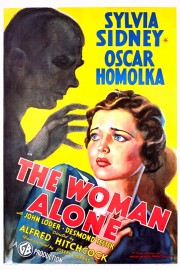Sabotage
As you begin to watch Alfred Hitchcock’s British films, prior to him coming to America to make “Rebecca,” one can see the ideas and tropes he would build upon throughout his career come into focus, even if there isn’t a whole lot of depth, emotionally or technically, in the film as a whole. His 1936 film, “Sabotage,” is a good example of the middle-ground thriller Hitch was making at this time- not as good as a “39 Steps” or “Lady Vanishes,” not as generic as, say, “Blackmail,” which was seven years earlier. What’s missing is the humor that seemed to flourish later in his career, and it’s why “Sabotage” is simply good rather than great.
The film begins with a blackout in London. Our main focus is on the movie theatre that will turn out to be the main focus of the story in this film. The owner of the theatre (Oskar Homolka) sneaks back into their apartment while his wife (Sylvia Sidney) tries to placate the crowd that is wanting their money back. Meanwhile, investigators from Scotland Yard find signs of sabotage in what has happened. The owner says to give the patrons their money back, but before that process begins proper, the lights come back on. Among the rabble at the theatre was a man claiming something fishy had occurred; that man (John Loder), it turns out, is an undercover officer with Scotland Yard, and he suspects the husband of being in league with people who are plotting to set off a bomb in London. The wife, who also has her younger brother (Desmond Tester) living with them, doesn’t want to believe it, although she doesn’t remember her husband being in their apartment when she checked earlier the night of the blackout.
“Sabotage” is based on a novel, The Secret Agent, by Joseph Conrad, and there’s perfunctory character building in the screenplay by Charles Bennett that went into this adaptation- case in point, few actual character names are listed on IMDB- but what the film has going for it in its 75-minute running time is precise and intelligent plotting, and a sympathetic story at the center, as Sidney’s wife character (Mrs. Verloc) realizes what is happening around her, and sees the destruction first-hand that her husband might be capable of, and is led to get out by Loder’s detective. The third act of the film is where Hitch’s skills come through best, as we see the payoffs of everything he has set up earlier in the movie happen, and a 1-2 punch that brings the destruction Homolka’s character is responsible for front-and-center in his final scenes with Sidney. There’s not much early on you’ll probably remember from “Sabotage,” but the ending is vintage Hitchcock, and you likely won’t forget how it unfolds.










